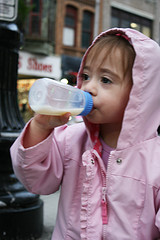
flickr.com/quinndombrowski
There are a lot of myths going around about bed wetting. Below are these myths and facts that you can believe.
Myth: Bed wetters are lazy.
Fact: Being lazy has nothing to do with wetting the bed. Bed wetting is involuntary. A lot of kids who wet their bed are deep sleepers who do not get to wake up when the brain says its time to empty the bladder. Calling a child lazy just because the child wets the bed could affect the self esteem.
Myth: Drinking too much liquid before bedtime causes bed wetting.
Fact: Although it is a good idea not to let kids drink too much liquid before bedtime, especially those with caffeine, this is not a reason for bed wetting.
Myth: Children who wet their bed have deep-seated psychological or emotional problem.
Fact: This may be the case but it is very rare. Kids who wet their bed are healthy, normal youngsters who have no control of their bladder yet, particularly at night. Bed wetting, however, can cause a kid to develop a psychological problem. There is also a form of bed wetting called secondary enuresis which can be caused by emotional issues like school problems or a family issue. Stressful situations like these can cause a child to wet the bed.
Myth: Using diapers or disposable underpants can prolong a child’s bed wetting habit.
Fact: Putting a disposable diaper on a child is a way to make sure a child does not wake up feeling wet and cold. This prevents too many laundry and having to change sheets in the middle of the night. Disposables will not prolong the child’s bed wetting. It is more about the child’s comfort and has nothing to do with when the habit will end either.
Here are some other facts that you might want to know.
Bed wetting could be genetic. Studies show that three out of four bed wetters belong to family with history of bed wetting.
Most kids outgrow that deep sleep that causes them to be unaware of the “internal signal to urinate.”
The bladders of some children are not really physically smaller but “functionally smaller.” This means the kids are not aware that their bladders are full and that they have to pee until they already did.
Some children who wet their beds make more urine. This is because of insufficient production of a hormone that tells the kidneys to make less urine when they are asleep.
Some medical conditions can cause bedwetting, all though is terribly rare. Some of these medical problems are bladder infections, constipation, diabetes, and spinal cord abnormalities. Among the four conditions mentioned, constipation is the most common medical reason for a child to wet the bed.
Tagged with: bed wetting • children bed wetting
Filed under: Bed Wetting